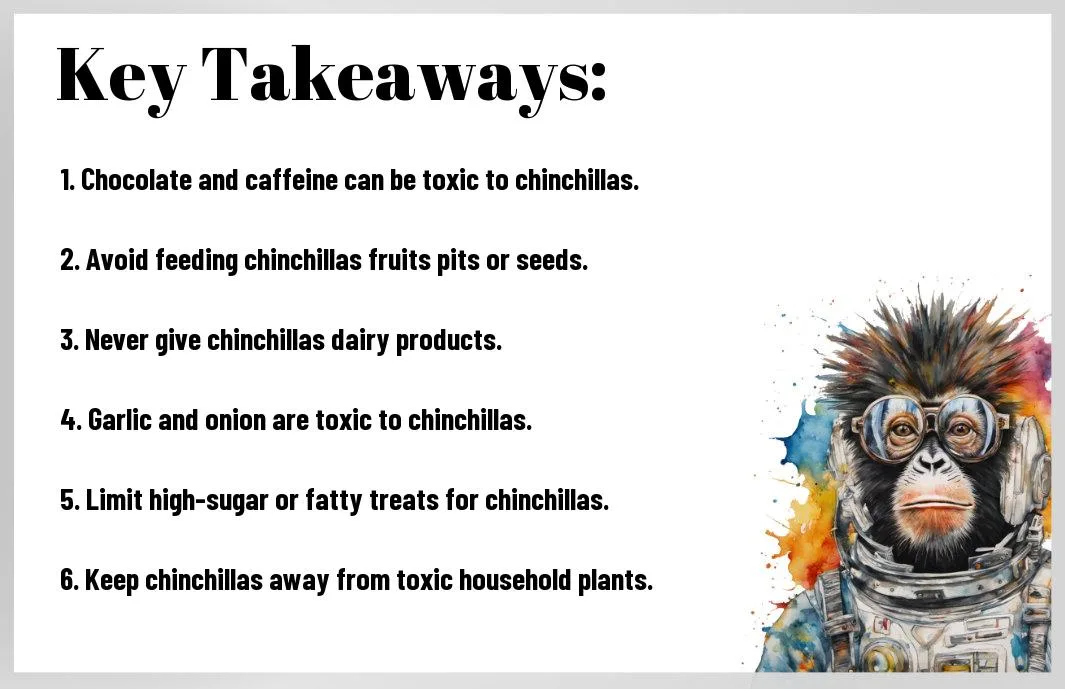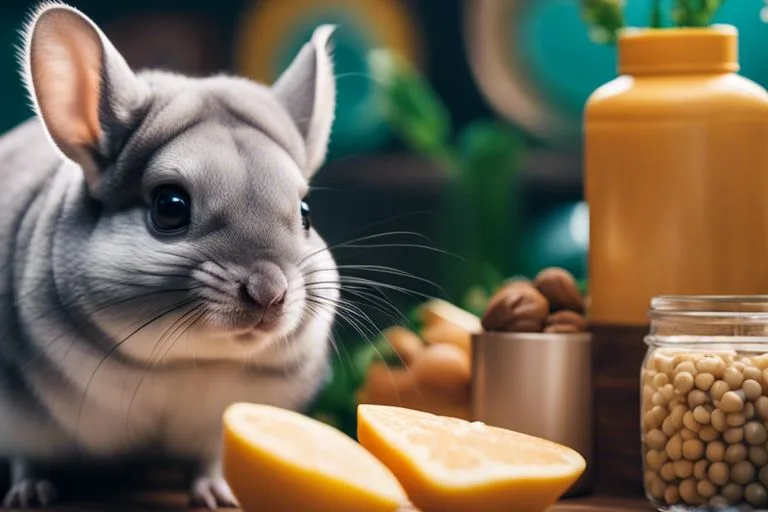With their delicate constitution, chinchillas are extremely vulnerable to certain substances that can prove fatal to them. It is crucial for chinchilla owners to be aware of what is toxic to these adorable furry creatures in order to ensure their well-being and health. Let’s investigate into the world of chinchilla care and discover what poses a danger to these lovable rodents.


Toxic Foods
High-Sugar Foods
To chinchillas, foods high in sugar are not only unhealthy but also toxic. These creatures have delicate digestive systems that cannot process high amounts of sugar, leading to gastrointestinal issues and obesity. It’s crucial to avoid feeding your chinchilla sugary treats like candies, chocolates, or any processed foods with high sugar content.
Citrus Fruits and Vegetables
On the list of foods toxic to chinchillas are citrus fruits and vegetables. Citrus fruits like oranges, lemons, and limes are too acidic for these small mammals and can cause severe digestive upset. Similarly, vegetables such as onions and garlic can be harmful due to their pungent nature, irritating a chinchilla’s system.
Vegetables
Raw or Undercooked Legumes
Foods like raw or undercooked legumes, including beans and peas, contain compounds that are toxic to chinchillas. These legumes can cause bloating, gas, and even lead to more severe issues like gastrointestinal blockages. It’s vital to thoroughly cook legumes before offering them to your chinchilla to avoid any potential harm.
Foods High in Fat
To chinchillas, foods high in fat are another no-go. While some fat is necessary in their diet, an excess amount can lead to obesity and liver issues. Foods like nuts and seeds should be given sparingly, as their high-fat content can be detrimental to your chinchilla’s health.
Toxic Substances
Cleaning Products
One common source of toxicity for chinchillas is cleaning products. These can contain harsh chemicals like bleach, ammonia, or phenols that can be harmful to your pets if inhaled or ingested.
Pesticides and Insecticides
An additional concern is pesticides and insecticides. Chinchillas are very sensitive creatures, and these chemicals can be extremely toxic to them. It is crucial to keep them away from any areas that have been treated with these substances.
To protect your chinchilla, it is important to be mindful of the products you use in your home. Always read labels carefully and opt for pet-safe alternatives when possible.
Paints and Varnishes
On the list of toxic substances for chinchillas are paints and varnishes. These can emit harmful fumes that are damaging to your pet’s respiratory system if exposed for extended periods.
When using paints or varnishes in your home, make sure to keep your chinchilla in a well-ventilated area, away from any fumes. Better yet, consider moving them to a different location until the odors have dissipated.
Air Fresheners and Deodorizers
Another potential danger for chinchillas is air fresheners and deodorizers. While these products may make your home smell nice, they often contain chemicals that can be harmful to your pet’s delicate respiratory system.
On top of being mindful of the products you use, it is also important to ensure proper ventilation in your chinchilla’s living space to prevent them from inhaling any harmful fumes that may be present in the air.
Toxin Environmental Factors
Many environmental factors can be toxic to chinchillas. Here are some key points to consider:
Extreme Temperatures
Extreme temperatures can be toxic to chinchillas. They thrive in moderate temperatures between 60-70 degrees Fahrenheit. Here are some additional points:
| Toxic | Chinchillas can easily overheat in temperatures above 75 degrees Fahrenheit |
| Toxic | Chinchillas can suffer from hypothermia in temperatures below 50 degrees Fahrenheit |
Humidity and Moisture
Environmental factors like humidity and moisture levels can also be toxic to chinchillas. Here are some additional details:
Factors: Chinchillas are sensitive to high humidity levels, which can lead to respiratory issues and fungal infections. It’s necessary to keep their living environment dry and well-ventilated.
Loud Noises and Stress
Temperatures are not the only toxic environmental factors for chinchillas. Loud noises and excessive stress can also be harmful. Here are some points to consider:
Stress: Chinchillas are sensitive animals and can easily get stressed by loud noises or sudden changes in their environment. It’s crucial to provide them with a quiet and calm living space.
Inadequate Ventilation
Humidity can also be a toxic factor if there is inadequate ventilation in the chinchilla’s living space. Here are some details to keep in mind:
Extreme: Poor ventilation can lead to a buildup of ammonia from urine fumes, which can be harmful to chinchillas’ respiratory systems. Ensuring proper airflow is necessary for their health and well-being.
Final Words
So, it is crucial to understand what is toxic to chinchillas in order to provide them with a safe and healthy environment. By being aware of common household dangers such as certain foods, plants, and cleaning products, chinchilla owners can prevent harm to their furry companions. Be mindful of, a little knowledge can go a long way in keeping these adorable creatures happy and thriving in our care.
FAQ
Q: What is toxic to chinchillas?
A: Chinchillas are sensitive creatures, and several common items can be toxic to them. Examples include chocolate, caffeine, onions, garlic, and avocado. It’s crucial to ensure that these items are kept far away from your chinchilla to prevent any harm.
Q: Can certain plants be toxic to chinchillas?
A: Yes, some plants can be harmful to chinchillas if ingested. Examples of toxic plants include lilies, tulips, and ivy. Chinchillas should not have access to these plants, as they can cause digestive issues or even more severe health problems.
Q: How important is it to monitor a chinchilla’s diet for potential toxins?
A: Monitoring a chinchilla’s diet is crucial in preventing exposure to toxic substances. Always provide a balanced diet of hay, pellets, and fresh water. Avoid feeding them human foods like sweets and snacks, as these can contain ingredients that are harmful to chinchillas. Regularly check their environment to ensure they do not have access to any toxic substances.
